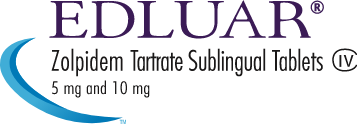For US Healthcare
Professionals only
-

Edluar (zolpidem tartrate) sublingual tablets are indicated for the short-term treatment of insomnia characterized by difficulties with sleep initiation. The clinical trials performed with zolpidem tartrate in support of efficacy were 4-5 weeks in duration with the final formal assessments of sleep latency performed at the end of treatment.
EDLUAR for short-term treatment of
insomnia patients who have trouble
falling asleepzz1 -

Edluar (zolpidem tartrate) sublingual tablets are indicated for the short-term treatment of insomnia characterized by difficulties with sleep initiation. The clinical trials performed with zolpidem tartrate in support of efficacy were 4-5 weeks in duration with the final formal assessments of sleep latency performed at the end of treatment.
Help your patients with insomnia
fall asleep with this short-term
treatment1 -

Edluar (zolpidem tartrate) sublingual tablets are indicated for the short-term treatment of insomnia characterized by difficulties with sleep initiation. The clinical trials performed with zolpidem tartrate in support of efficacy were 4-5 weeks in duration with the final formal assessments of sleep latency performed at the end of treatment.
Zolpidem tartrate data related
to sedative/hypnotic concerns1
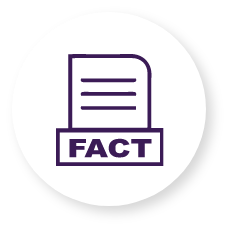
Learn more about the Efficacy of EDLUAR
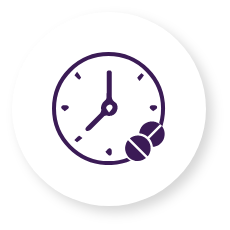
Read more about Dosing
of EDLUAR

Learn about Safety and Tolerability of EDLUAR
About EDLUAR
Melt into Sleep with EDLUAR Sublingual Tablets
Edluar (zolpidem tartrate) sublingual tablets are indicated for the short-term treatment of insomnia characterized by difficulties with sleep initiation.1
The clinical trials performed with zolpidem tartrate in support of efficacy were 4-5 weeks in duration with the final formal assessments of sleep latency performed at the end of treatment.1
Why Prescribe EDLUAR?
In clinical trials for transient and chronic insomnia, zolpidem tartrate demonstrated1:
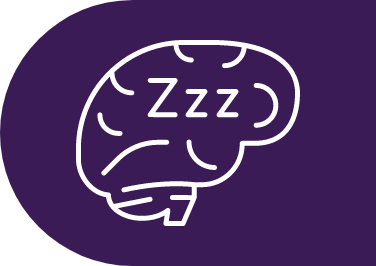
Reduction in sleep latency
Efficacy
Established Clinical Efficacy in Patients with Insomnia Characterized by Sleep Latency1
In normal adults with transient and chronic insomnia, zolpidem tartrate oral tablets were superior to placebo on the objective (polysomnographic) measure of sleep latency.1
Transient Insomnia Clinical Studies
Normal adults experiencing transient insomnia (n = 462) during the first night in a sleep laboratory were evaluated in a double-blind, parallel-group, single-night trial comparing two doses of zolpidem tartrate oral tablets (7.5 and 10 mg) and placebo. Normal elderly adults (mean age 68) experiencing transient insomnia (n = 35) during the first 2 nights in a sleep laboratory were evaluated in a double-blind, crossover, two-night trial comparing four doses of zolpidem (5, 10, 15 and 20 mg) and placebo. All doses of zolpidem tartrate were superior to placebo when compared for the primary endpoint of the polysomnographic (PSG) sleep latency measure in both trials.
Chronic Insomnia Clinical Studies
Zolpidem was evaluated in two double-blind, parallel-group, controlled studies for the treatment of patients with chronic insomnia. One study included adult outpatients (n = 75) in a 5-week trial and another study had adult outpatients (n =141) in a 4-week trial comparing two doses of zolpidem tartrate and placebo. Zolpidem 10 mg tablets were superior to placebo on the PSG parameter of sleep latency for the first 4 out of 5-week trial and were superior to placebo on a subjective measure of sleep latency for all 4 weeks of the 4-week trial.
Safety
Safety Profile for Sedative/Hypnotic Concerns
Placebo-controlled studies evaluating safety concerns of zolpidem tartrate oral tablets in adult patients showed1:

Next-day residual effects
- Next-day residual effects of zolpidem tartrate were evaluated in seven studies involving normal subjects. In three studies in adults and one study in elderly subjects, a small but statistically significant decrease in performance was observed in the Digital Symbol Substitution Test (DSST) when compared to placebo1
- No evidence of next-day residual effects in non-elderly patients with insomnia was detected in studies using the DSST, the Multiple Sleep Latency Test and patient ratings of alertness1

Rebound effects
- No objective (polysomnographic) evidence of rebound insomnia at recommended doses was seen in studies evaluating sleep on the nights following discontinuation of zolpidem tartrate1
- There was subjective evidence of impaired sleep in the elderly on the first post-treatment night at doses above the recommended elderly dose of 5 mg1

Memory impairment
- No consistent evidence of next-day memory impairment following the administration of zolpidem tartrate1
- However, in one study involving zolpidem doses of 10 mg and 20 mg, there was a significant decrease in next-morning recall of information presented to subjects during the peak drug effect (90 minutes post dose, these subjects experienced anterograde amnesia)1
- There is also subjective evidence from adverse event data for anterograde amnesia occurring in association with administration of zolpidem tartrate (predominantly at doses above 10 mg)1
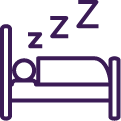
Effect on sleep stages
- In studies that measured the percentage of sleep time spent in each sleep stage, zolpidem tartrate has generally been shown to preserve sleep stages. Sleep time spent in stages 3 and 4 (deep sleep) was found comparable to placebo with only inconsistent, minor changes in REM (paradoxical) sleep at the recommended dose1
Clinical Safety for EDLUAR1
Most commonly observed adverse reactions in controlled trials:
During short-term treatment (up to 10 nights) with zolpidem tartrate at doses up to 10 mg, the most commonly observed adverse reactions associated with the use of zolpidem and seen at statistically significant differences from placebo-treated patients were drowsiness (reported by 2% of zolpidem patients), dizziness (1%), and diarrhea (1%).
During longer-term treatment (28 to 35 nights) with zolpidem tartrate at doses up to 10 mg, the most commonly observed adverse reactions associated with the use of zolpidem and seen at statistically significant differences from placebo-treated patients were dizziness (5%) and drugged feelings (3%).
The following table was derived from a pool of 11 placebo-controlled short-term U.S. efficacy trials involving zolpidem in doses ranging from 1.25 to 20 mg. The table is limited to data from doses up to and including 10 mg, the highest dose recommended for use.
| Incidence of Treatment-Emergent Adverse Experiences in Placebo-Controlled Clinical Trials with Zolpidem Tartrate Lasting up to 10 Nights (Percentage of Patients Reporting)1 |
||
|---|---|---|
| Body System/Adverse Event* | Zolpidem tartrate (≤10 mg) (N = 685) |
Placebo (N = 473) |
| Central and Peripheral Nervous System | ||
| Headache | 7 | 6 |
| Drowsiness | 2 | - |
| Dizziness | 1 | - |
| Gastrointestinal System | ||
| Diarrhea | 1 | - |
| *Reactions reported by at least 1% of patients treated with oral zolpidem and at a greater frequency than placebo. | ||
The following table was derived from a pool of three placebo-controlled long-term efficacy trials involving oral zolpidem. These trials involved patients with chronic insomnia who were treated for 28 to 35 nights with zolpidem at doses of 5, 10, or 15 mg. The table is limited to data from doses up to and including 10 mg, the highest dose recommended for use. The table includes only adverse events occurring at an incidence of at least 1% for zolpidem patients.
| Incidence of Treatment-Emergent Adverse Experiences in Placebo-Controlled Clinical Trials with Zolpidem Tartrate Lasting up to 35 nights (Percentage of Patients Reporting)1 | ||
|---|---|---|
| Body System/Adverse Events* | Zolpidem tartrate (≤10 mg) (N=152) |
Placebo (N=161) |
| Autonomic Nervous System | ||
| Dry mouth | 3 | 1 |
| Body as a Whole | ||
| Allergy | 4 | 1 |
| Back Pain | 3 | 2 |
| Influenza-like symptoms | 2 | – |
| Chest pain | 1 | – |
| Cardiovascular System | ||
| Palpitation | 2 | – |
| Central and Peripheral Nervous System | ||
| Drowsiness | 8 | 5 |
| Dizziness | 5 | 1 |
| Lethargy | 3 | 1 |
| Drugged feeling | 3 | – |
| Lightheadedness | 2 | 1 |
| Depression | 2 | 1 |
| Abnormal dreams | 1 | – |
| Amnesia | 1 | – |
| Sleep disorder | 1 | – |
| Gastrointestinal System | ||
| Diarrhea | 3 | 2 |
| Abdominal pain | 2 | 2 |
| Constipation | 2 | 1 |
| Respiratory System | ||
| Sinusitis | 4 | 2 |
| Pharyngitis | 3 | 1 |
| Skin and Appendages | ||
| Rash | 2 | 1 |
| *Reactions were reported by at least 1% of patients treated with oral zolpidem and at a greater frequency than placebo. | ||
Dosage and Administration
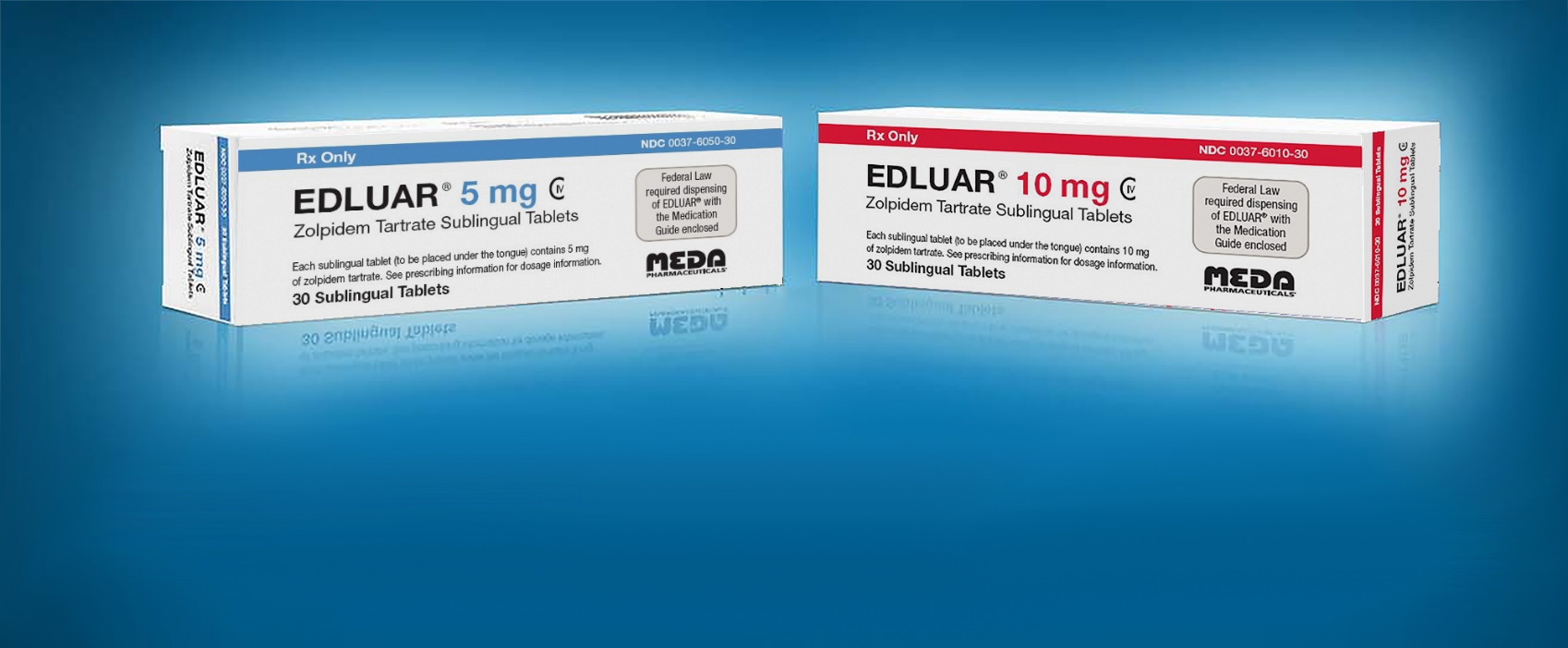
EDLUAR is available in 5 mg and 10 mg strength tablets for sublingual administration1

Dosage in Adults1
Use the lowest dose effective for the patient. The recommended initial dose is 5 mg for women and 5 or 10 mg for men, taken only once per night immediately before bedtime with at least 7-8 hours remaining before the planned time of awakening. If the 5 mg dose is not effective, the dose can be increased to 10 mg. In some patients, the higher morning blood levels following use of the 10 mg dose increase the risk of next day impairment of driving and other activities that require full alertness. The total dose of EDLUAR should not exceed 10 mg once daily.

Special Population1
Elderly or debilitated patients may be especially sensitive to the effects of zolpidem tartrate. Patients with hepatic insufficiency do not clear the drug as rapidly as normal subjects. The recommended dose of EDLUAR in both of these patient populations is 5 mg once daily immediately before bedtime.

CNS Depressants1
Dosage adjustment may be necessary when EDLUAR is combined with other CNS-depressant drugs because of the potentially additive effects.

Administration1
The effect of EDLUAR may be slowed if taken with or immediately after a meal. EDLUAR sublingual tablet should be placed under the tongue, where it will disintegrate. The tablet should not be swallowed and the tablet should not be taken with water.
CNS: Central nervous system.
IMPORTANT SAFETY INFORMATION AND INDICATION
Scroll for more
IMPORTANT SAFETY INFORMATION
WARNING: COMPLEX SLEEP BEHAVIORS
Complex sleep behaviors including sleep-walking, sleep-driving, and engaging in other activities while not fully awake may occur following use of Edluar. Some of these events may result in serious injuries, including death. Discontinue Edluar immediately if a patient experiences a complex sleep behavior.
CONTRAINDICATIONS
- Edluar is contraindicated in patients who have experienced complex sleep behaviors after taking Edluar and with known hypersensitivity to zolpidem. Observed reactions include anaphylaxis and angioedema.
WARNINGS AND PRECAUTIONS
-
Complex Sleep Behaviors: Complex sleep behaviors including sleep-walking, sleep-driving, and engaging in other activities while not fully awake may occur following use of zolpidem. Patients can be seriously injured or injure others during complex sleep behaviors. Such injuries may result in a fatal outcome. Other complex sleep behaviors (e.g., preparing and eating food, making phone calls, or having sex) have also been reported. Patients usually do not remember these events. Post-marketing reports have shown that complex sleep behaviors may occur with zolpidem alone at recommended dosages, with or without concomitant use of alcohol or other CNS depressants. Discontinue Edluar immediately if a patient experiences a complex sleep behavior.
-
CNS Depressant Effects and Next-Day Impairment: Edluar, like other sedative-hypnotic drugs, has CNS depressant effects. Co-administration with other CNS depressants (e.g., benzodiazepines, opioids, tricyclic antidepressants, alcohol) increases the risk of CNS depression. Dosage adjustments of Edluar and concomitant CNS depressants may be necessary when administered together. The use of Edluar with other sedative-hypnotics (including other zolpidem products) at bedtime or the middle of the night is not recommended.
The risk of next-day psychomotor impairment, including impaired driving, is increased if Edluar is taken with less than a full night of sleep remaining (7 to 8 hours); if a higher than the recommended dose is taken; if co-administered with other CNS depressants; or if co-administered with other drugs that increase the blood level of zolpidem. Patients should be cautioned against driving and other activities requiring complete mental alertness.
Because Edluar can cause drowsiness and a decreased level of consciousness, patients, particularly the elderly, are at higher risk of falls.
-
Need to Evaluate for Co-morbid Diagnoses: Treatment of insomnia should be initiated only after a careful evaluation of the patient. Re-evaluate for comorbid conditions if insomnia persists or worsens after 7 to 10 days of treatment. Worsening of insomnia or the emergence of new thinking or behavior abnormalities may be the consequence of an unrecognized psychiatric or physical disorder and can emerge during the course of treatment with sedative/hypnotic drugs, including zolpidem.
-
Severe Anaphylactic and Anaphylactoid Reactions: Cases of angioedema involving the tongue, glottis or larynx have been reported in patients after taking the first or subsequent doses of sedative-hypnotics, including zolpidem tartrate. Some patients have had additional symptoms such as dyspnea, throat closing or nausea and vomiting that suggest anaphylaxis. Some patients have required medical therapy in the emergency department. If angioedema involves the throat, glottis or larynx, airway obstruction may occur and be fatal. Patients who develop angioedema after treatment with Edluar should not be rechallenged with the drug.
-
Abnormal Thinking and Behavioral Changes: Abnormal thinking and behavior changes have been reported in patients treated with sedative/hypnotics, including zolpidem. Some of these changes included decreased inhibition (e.g., aggressiveness and extroversion that seemed out of character), bizarre behavior, agitation and depersonalization. Visual and auditory hallucinations have been reported. Emergence of any new behavioral sign or symptom of concern requires careful and immediate evaluation.
-
Use in Patients with Depression: In primarily depressed patients treated with sedative-hypnotics, worsening of depression, and suicidal thoughts and actions (including completed suicides), have been reported. Suicidal tendencies may be present in such patients and protective measures may be required. Intentional overdosage is more common in this group of patients; therefore, the least amount of drug that is feasible should be prescribed for the patient at any one time.
-
Respiratory Depression: Studies with 10 mg zolpidem tartrate did not reveal respiratory depressant effects at hypnotic doses in healthy subjects or in patients with mild-to-moderate chronic obstructive pulmonary disease (COPD). A reduction in the Total Arousal Index, together with a reduction in lowest oxygen saturation and increase in the time of oxygen desaturation below 80% and 90%, was observed in patients with mild-to-moderate sleep apnea when treated with zolpidem compared to placebo. Since sedative hypnotics have the capacity to depress respiratory drive, precautions should be taken if Edluar is prescribed to patients with compromised respiratory function. The risks of respiratory depression should be considered prior to prescribing Edluar in patients with respiratory impairment including sleep apnea and myasthenia gravis.
-
Withdrawal Effects: There have been reports of withdrawal signs and symptoms following the rapid dose decrease or abrupt discontinuation of zolpidem. Monitor patients for tolerance, abuse, and dependence.
ADVERSE EVENTS
-
During short-term treatment (up to 10 nights) at doses up to 10 mg, the most common adverse reactions in controlled clinical trials were drowsiness (2%), dizziness (1%), and diarrhea (1%). During longer-term treatment (28 to 35 nights) at doses up to 10 mg, the most common adverse reactions that were also statistically different from placebo were dizziness (5%) and drugged feelings (3%).
DRUG INTERACTIONS
- Co-administration of zolpidem with other CNS depressants increases the risk of CNS depression
- Imipramine used in combination with zolpidem produced an additive effect of decreased alertness. Similarly, chlorpromazine used in combination with zolpidem produced impaired alertness and psychomotor performance
- An additive adverse effect on psychomotor performance between alcohol and oral zolpidem was demonstrated
- Concomitant administration of zolpidem and sertraline increases exposure to zolpidem and may increase the pharmacodynamics effect of zolpidem
- Rifampin, a CYP3A4 inducer, in combination with zolpidem may decrease the efficacy of zolpidem
- Ketoconazole, a potent CYP3A4 inhibitor, in combination with zolpidem increased the pharmacodynamics effects of zolpidem. Consideration should be given to using a lower dose of zolpidem when ketoconazole and zolpidem are given together
USE IN SPECIAL POPULATIONS
-
Pregnancy: Published data on the use of zolpidem during pregnancy have not identified a drug-associated risk of major birth defects. Neonates born to mothers using zolpidem late in the third trimester of pregnancy have been reported to experience symptoms of respiratory depression and sedation. Fetal/neonatal adverse reactions: Zolpidem crosses the placenta and may produce respiratory depression and sedation in neonates. Monitor neonates exposed to Edluar during pregnancy and labor for signs of excess sedation, hypotonia, and respiratory depression and manage accordingly.
-
Lactation: Infants exposed to Edluar through breastmilk should be monitored for excess sedation, hypotonia, and respiratory depression. A lactating woman may consider interrupting breastfeeding and pumping and discarding breast milk during treatment and for 23 hours (approximately 5 elimination half-lives) after Edluar administration in order to minimize drug exposure to a breast fed infant.
-
Pediatric Use: Edluar is not recommended for use in children. Safety and effectiveness in pediatric patients have not been established in pediatric patients below the age of 18.
-
Geriatric Use: The dose of Edluar in elderly patients is 5 mg to minimize adverse effects related to impaired motor and/or cognitive performance and unusual sensitivity to sedative/hypnotic drugs.
-
Gender Differences in Pharmacokinetics: Women clear zolpidem tartrate from the body at a lower rate than men, therefore the recommended dose of Edluar for adult women is 5 mg and 5 or 10 mg for adult men.
DRUG ABUSE AND DEPENDENCE
- Edluar contains zolpidem tartrate which is classified as a Schedule IV controlled substance by federal regulation.
- Because persons with a history of addiction to or abuse of, drugs or alcohol are at increased risk for misuse, abuse, and addiction of Edluar, they should be monitored carefully when receiving Edluar or any other hypnotic.
- Use the lowest effective dose for the patient.
- Sedative/hypnotics have produced withdrawal signs and symptoms following abrupt discontinuation. These reported symptoms range from mild dysphoria and insomnia to a withdrawal syndrome that may include abdominal and muscle cramps, vomiting, sweating, tremors, and convulsions.
OVERDOSAGE
- Recommended Treatment
General symptomatic and supportive measures for overdose with Edluar should be used along with immediate gastric lavage where appropriate. Intravenous fluids should be administered as needed. Flumazenil reduces zolpidem’s sedative/hypnotic effect however, flumazenil administration may contribute to the appearance of neurological symptoms (convulsions). As in all cases of drug overdose, respiration, pulse, blood pressure, and other appropriate signs should be monitored, and general supportive measures employed. Hypotension and CNS depression should be monitored and treated by appropriate medical intervention. Sedating drugs should be withheld following zolpidem overdosage, even if excitation occurs. The value of dialysis in the treatment of overdosage has not been determined, although hemodialysis studies in patients with renal failure receiving therapeutic doses have demonstrated that zolpidem is not dialyzable.
The possibility of multiple drug ingestion should be considered and the physician may consider contacting a poison control center for up-to-date information on the management of hypnotic drug product overdosage.
INDICATIONS AND USAGE
Edluar (zolpidem tartrate) sublingual tablets are indicated for the short-term treatment of insomnia characterized by difficulties with sleep initiation. The clinical trials performed with zolpidem tartrate in support of efficacy were 4-5 weeks in duration with the final formal assessments of sleep latency performed at the end of treatment.
Click here for Full Prescribing Information including Boxed WARNING and Medication Guide.
Reference: 1. EDLUAR [prescribing information]. Somerset, NJ: Meda Pharmaceuticals Inc.; 2021.
IMPORTANT SAFETY INFORMATION
WARNING: COMPLEX SLEEP BEHAVIORS
Complex sleep behaviors including sleep-walking, sleep-driving, and engaging in other activities while not fully awake may occur following use of Edluar. Some of these events may result in serious injuries, including death. Discontinue Edluar immediately if a patient experiences a complex sleep behavior.
CONTRAINDICATIONS
- Edluar is contraindicated in patients who have experienced complex sleep behaviors after taking Edluar and with known hypersensitivity to zolpidem. Observed reactions include anaphylaxis and angioedema.
WARNINGS AND PRECAUTIONS
-
Complex Sleep Behaviors: Complex sleep behaviors including sleep-walking, sleep-driving, and engaging in other activities while not fully awake may occur following use of zolpidem. Patients can be seriously injured or injure others during complex sleep behaviors. Such injuries may result in a fatal outcome. Other complex sleep behaviors (e.g., preparing and eating food, making phone calls, or having sex) have also been reported. Patients usually do not remember these events. Post-marketing reports have shown that complex sleep behaviors may occur with zolpidem alone at recommended dosages, with or without concomitant use of alcohol or other CNS depressants. Discontinue Edluar immediately if a patient experiences a complex sleep behavior.
-
CNS Depressant Effects and Next-Day Impairment: Edluar, like other sedative-hypnotic drugs, has CNS depressant effects. Co-administration with other CNS depressants (e.g., benzodiazepines, opioids, tricyclic antidepressants, alcohol) increases the risk of CNS depression. Dosage adjustments of Edluar and concomitant CNS depressants may be necessary when administered together. The use of Edluar with other sedative-hypnotics (including other zolpidem products) at bedtime or the middle of the night is not recommended.
The risk of next-day psychomotor impairment, including impaired driving, is increased if Edluar is taken with less than a full night of sleep remaining (7 to 8 hours); if a higher than the recommended dose is taken; if co-administered with other CNS depressants; or if co-administered with other drugs that increase the blood level of zolpidem. Patients should be cautioned against driving and other activities requiring complete mental alertness.
Because Edluar can cause drowsiness and a decreased level of consciousness, patients, particularly the elderly, are at higher risk of falls.
-
Need to Evaluate for Co-morbid Diagnoses: Treatment of insomnia should be initiated only after a careful evaluation of the patient. Re-evaluate for comorbid conditions if insomnia persists or worsens after 7 to 10 days of treatment. Worsening of insomnia or the emergence of new thinking or behavior abnormalities may be the consequence of an unrecognized psychiatric or physical disorder and can emerge during the course of treatment with sedative/hypnotic drugs, including zolpidem.
-
Severe Anaphylactic and Anaphylactoid Reactions: Cases of angioedema involving the tongue, glottis or larynx have been reported in patients after taking the first or subsequent doses of sedative-hypnotics, including zolpidem tartrate. Some patients have had additional symptoms such as dyspnea, throat closing or nausea and vomiting that suggest anaphylaxis. Some patients have required medical therapy in the emergency department. If angioedema involves the throat, glottis or larynx, airway obstruction may occur and be fatal. Patients who develop angioedema after treatment with Edluar should not be rechallenged with the drug.
-
Abnormal Thinking and Behavioral Changes: Abnormal thinking and behavior changes have been reported in patients treated with sedative/hypnotics, including zolpidem. Some of these changes included decreased inhibition (e.g., aggressiveness and extroversion that seemed out of character), bizarre behavior, agitation and depersonalization. Visual and auditory hallucinations have been reported. Emergence of any new behavioral sign or symptom of concern requires careful and immediate evaluation.
-
Use in Patients with Depression: In primarily depressed patients treated with sedative-hypnotics, worsening of depression, and suicidal thoughts and actions (including completed suicides), have been reported. Suicidal tendencies may be present in such patients and protective measures may be required. Intentional overdosage is more common in this group of patients; therefore, the least amount of drug that is feasible should be prescribed for the patient at any one time.
-
Respiratory Depression: Studies with 10 mg zolpidem tartrate did not reveal respiratory depressant effects at hypnotic doses in healthy subjects or in patients with mild-to-moderate chronic obstructive pulmonary disease (COPD). A reduction in the Total Arousal Index, together with a reduction in lowest oxygen saturation and increase in the time of oxygen desaturation below 80% and 90%, was observed in patients with mild-to-moderate sleep apnea when treated with zolpidem compared to placebo. Since sedative hypnotics have the capacity to depress respiratory drive, precautions should be taken if Edluar is prescribed to patients with compromised respiratory function. The risks of respiratory depression should be considered prior to prescribing Edluar in patients with respiratory impairment including sleep apnea and myasthenia gravis.
-
Withdrawal Effects: There have been reports of withdrawal signs and symptoms following the rapid dose decrease or abrupt discontinuation of zolpidem. Monitor patients for tolerance, abuse, and dependence.
ADVERSE EVENTS
-
During short-term treatment (up to 10 nights) at doses up to 10 mg, the most common adverse reactions in controlled clinical trials were drowsiness (2%), dizziness (1%), and diarrhea (1%). During longer-term treatment (28 to 35 nights) at doses up to 10 mg, the most common adverse reactions that were also statistically different from placebo were dizziness (5%) and drugged feelings (3%).
DRUG INTERACTIONS
- Co-administration of zolpidem with other CNS depressants increases the risk of CNS depression
- Imipramine used in combination with zolpidem produced an additive effect of decreased alertness. Similarly, chlorpromazine used in combination with zolpidem produced impaired alertness and psychomotor performance
- An additive adverse effect on psychomotor performance between alcohol and oral zolpidem was demonstrated
- Concomitant administration of zolpidem and sertraline increases exposure to zolpidem and may increase the pharmacodynamics effect of zolpidem
- Rifampin, a CYP3A4 inducer, in combination with zolpidem may decrease the efficacy of zolpidem
- Ketoconazole, a potent CYP3A4 inhibitor, in combination with zolpidem increased the pharmacodynamics effects of zolpidem. Consideration should be given to using a lower dose of zolpidem when ketoconazole and zolpidem are given together
USE IN SPECIAL POPULATIONS
-
Pregnancy: Published data on the use of zolpidem during pregnancy have not identified a drug-associated risk of major birth defects. Neonates born to mothers using zolpidem late in the third trimester of pregnancy have been reported to experience symptoms of respiratory depression and sedation. Fetal/neonatal adverse reactions: Zolpidem crosses the placenta and may produce respiratory depression and sedation in neonates. Monitor neonates exposed to Edluar during pregnancy and labor for signs of excess sedation, hypotonia, and respiratory depression and manage accordingly.
-
Lactation: Infants exposed to Edluar through breastmilk should be monitored for excess sedation, hypotonia, and respiratory depression. A lactating woman may consider interrupting breastfeeding and pumping and discarding breast milk during treatment and for 23 hours (approximately 5 elimination half-lives) after Edluar administration in order to minimize drug exposure to a breast fed infant.
-
Pediatric Use: Edluar is not recommended for use in children. Safety and effectiveness in pediatric patients have not been established in pediatric patients below the age of 18.
-
Geriatric Use: The dose of Edluar in elderly patients is 5 mg to minimize adverse effects related to impaired motor and/or cognitive performance and unusual sensitivity to sedative/hypnotic drugs.
-
Gender Differences in Pharmacokinetics: Women clear zolpidem tartrate from the body at a lower rate than men, therefore the recommended dose of Edluar for adult women is 5 mg and 5 or 10 mg for adult men.
DRUG ABUSE AND DEPENDENCE
- Edluar contains zolpidem tartrate which is classified as a Schedule IV controlled substance by federal regulation.
- Because persons with a history of addiction to or abuse of, drugs or alcohol are at increased risk for misuse, abuse, and addiction of Edluar, they should be monitored carefully when receiving Edluar or any other hypnotic.
- Use the lowest effective dose for the patient.
- Sedative/hypnotics have produced withdrawal signs and symptoms following abrupt discontinuation. These reported symptoms range from mild dysphoria and insomnia to a withdrawal syndrome that may include abdominal and muscle cramps, vomiting, sweating, tremors, and convulsions.
OVERDOSAGE
- Recommended Treatment
General symptomatic and supportive measures for overdose with Edluar should be used along with immediate gastric lavage where appropriate. Intravenous fluids should be administered as needed. Flumazenil reduces zolpidem’s sedative/hypnotic effect however, flumazenil administration may contribute to the appearance of neurological symptoms (convulsions). As in all cases of drug overdose, respiration, pulse, blood pressure, and other appropriate signs should be monitored, and general supportive measures employed. Hypotension and CNS depression should be monitored and treated by appropriate medical intervention. Sedating drugs should be withheld following zolpidem overdosage, even if excitation occurs. The value of dialysis in the treatment of overdosage has not been determined, although hemodialysis studies in patients with renal failure receiving therapeutic doses have demonstrated that zolpidem is not dialyzable.
The possibility of multiple drug ingestion should be considered and the physician may consider contacting a poison control center for up-to-date information on the management of hypnotic drug product overdosage.
INDICATIONS AND USAGE
Edluar (zolpidem tartrate) sublingual tablets are indicated for the short-term treatment of insomnia characterized by difficulties with sleep initiation. The clinical trials performed with zolpidem tartrate in support of efficacy were 4-5 weeks in duration with the final formal assessments of sleep latency performed at the end of treatment.
Click here for Full Prescribing Information including Boxed WARNING and Medication Guide.
EDLUAR is a registered trademark of Meda Pharmaceuticals Inc., a Viatris Company.
VIATRIS and the Viatris Logo are trademarks of Mylan Inc., a Viatris Company.
© 2023 Viatris Inc. All Rights Reserved. EDL-2021-0023
 Email us
Email us
- Privacy Notice
- Cookie Notice
- California Supplemental Disclosure
- Copyright and Legal Disclaimer
- Contact Us
